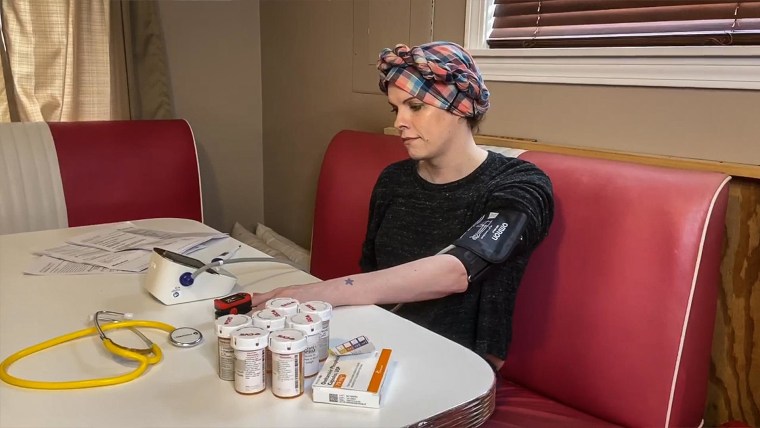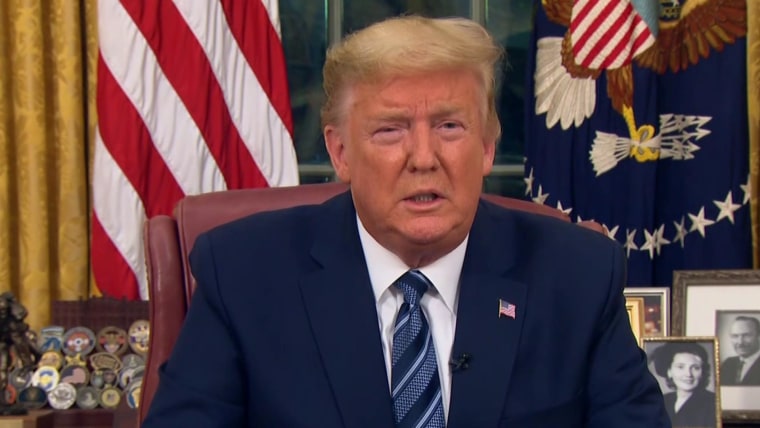WASHINGTON — Health care was already a vulnerability for President Donald Trump before the coronavirus pandemic hit. Now his lack of a plan to fix the system is coming under a new microscope as the crisis costs many Americans their coverage and overwhelms providers.
The clarity in Trump's health care vision begins and ends with repealing the Affordable Care Act, or ACA, also known as Obamacare. His budget proposals would strip away funding for the law, and he has endorsed a lawsuit to wipe it off the books. But the president hasn't thrown his weight behind a replacement bill or even an outline, and he has rejected calls to reopen Obamacare for enrollment during the current crisis.
Trump's focus on mitigating the economic damage has kept health care on the back burner. Some allies worry that with millions of newly unemployed Americans poised to lose coverage during a public health crisis, Trump's lack of a plan for the needy will be a political liability in his re-election bid.
Full coverage of the coronavirus outbreak
"Not having a plan for the rising uninsured yet seems to be a blind spot," Dan Eberhart, an oil executive and Trump donor, told NBC News. "The Democrats took the House in the 2018 midterms largely by having better answers on health care, so I think this could be a massive political liability in the fall.
"Trump has provided sober and strong leadership, but this could prove to be his Achilles' heel in November," he said.
The virus outbreak catches Trump in a bind, caught between fulfilling a 2016 campaign promise and the unpopular real-world consequences of ending ACA subsidies and protections that have become more salient for voters as the law faces credible threat of termination. Trump has chipped away at provisions like the individual mandate to buy coverage, but the bulk of the law is still alive.
Joe Biden, the likely Democratic nominee against Trump this fall, has vowed to protect Obamacare and extend coverage with more generous subsidies and to add a government-run insurance option to the menu. Biden's plan seeks to cut drug costs by giving Medicare the authority to negotiate prices.
In a virtual news conference Thursday, Biden called on Trump to "do the right thing and open up a new enrollment for Obamacare so that people who need insurance now can get it.
"Now is not the time for petty politics. This is a national emergency," he said.
The president has rejected that call. A former Department of Health and Human Services official close to the White House said the administration fears that such a move would undercut its push to overturn the ACA in court.
Let our news meet your inbox. The news and stories that matters, delivered weekday mornings.
Trump faces voter skepticism on health care
Trump offers no details on a replacement plan on his campaign website or on WhiteHouse.gov, where the health care section argues that Obamacare is "hurting American families, farmers, and small businesses" and calls for a replacement with lower costs and more competition without explaining how such a system would work.
Asked how Trump wants to fix the system, a White House official referred to his comments at the coronavirus briefings, at which he has offered piecemeal ideas for the immediate crisis.
"Hospitals and health care providers treating uninsured coronavirus patients will be reimbursed by the federal government using funds from the economic relief package Congress passed last month," Trump told reporters Friday. "This should alleviate any concern uninsured Americans may have about seeking the coronavirus treatment."
But it's unclear whether that will be enough. Health and Human Services Secretary Alex Azar said people who lose their job-based coverage are eligible for ACA enrollment, although he didn't mention the administration's push to eliminate the law.
The average ACA premium for the cheapest type of plan on the menu is $331 per month, according to the nonpartisan Kaiser Family Foundation. The recently approved cash payments of up to $1,200 for individuals making less than six figures would cover fewer than four months of that cost, and some Americans may not get that money for months.
Even before the coronavirus emergency, health care was a top concern for voters, and Trump was faring poorly. That is continuing: A Washington Post-ABC News poll released last week showed Trump trailing Biden by 13 points on whom Americans trust more to handle health care, even as he outperformed his rival on handling of the economy and statistically tied him on the virus outbreak.
Trump's health care vision has been frozen since his repeal push failed in Congress and contributed to big 2018 victories for Democrats, who told horror stories about how his plans would harm sick people. Exit polls in the midterm election showed that health care was the No. 1 issue, and voters who cited it supported Democratic candidates by 75 percent to 23 percent.
He has since spoken warmly about the so-called Graham-Cassidy plan to roll back the ACA and give each state a batch of money to set up its own system. But with a divided Congress offering little hope of major health care legislation, Trump has turned his focus to finding new ways to weaken the ACA.
Republicans intend to 'stay on offense'
Michael Steel, a Republican strategist who worked on Obamacare repeal efforts as an aide to former House Speaker John Boehner, said any replacement plan would come with political risks.
"It's important to have certain key principles laid out publicly — like protection for pre-existing conditions and lower costs — but a full-blown, detailed plan to replace Obamacare would probably involve policy trade-offs that he'd rather not have to explain or defend," he said.
Republicans had hoped to make the 2020 election a referendum on "Medicare for All" plans that would eliminate private insurance, which many Democratic contenders had supported. But with Biden, a consistent opponent, coasting to the nomination, that message is probably out the window.
Download the NBC News app for full coverage and alerts about the coronavirus outbreak
Matt Gorman, a Republican operative who worked for the House GOP campaign arm in 2018, said he expects the party to "stay on offense" against both Medicare for All and Biden-style expansions in government-run health care.
Eliminating the ACA risks stripping coverage for the roughly 20 million people who have gained it under the exchanges, as well as Medicaid expansion and rules letting young people up to age 26 stay on a parent's plan. It would also allow insurers to return to the pre-ACA practice of denying coverage to sick people, charging them higher prices and refusing to pay for care in certain circumstances.
"Essentially, we'd have a lot more uninsured people," said Sabrina Corlette, a research professor who is director of Georgetown University's Center on Health Insurance Reforms. "The Trump administration's plan beyond continuing to call for repeal of the ACA is less than clear."
Spiking uninsured rates would have consequences across the system, she said. Hospitals treating patients without coverage would be hit with uncompensated care costs and would try to pass them on to taxpayers or employer-based plans. Providers unable to recoup the expenses might have to shut down, and businesses that face surging insurance costs might have to throw employees off their plans.
"It really could be a downward spiral," Corlette said.
"plan" - Google News
April 06, 2020 at 03:32PM
https://ift.tt/2UJWw8w
'His Achilles' heel': Coronavirus crisis highlights Trump's lack of health care plan - NBC News
"plan" - Google News
https://ift.tt/2un5VYV
Shoes Man Tutorial
Pos News Update
Meme Update
Korean Entertainment News
Japan News Update
Bagikan Berita Ini
















0 Response to "'His Achilles' heel': Coronavirus crisis highlights Trump's lack of health care plan - NBC News"
Post a Comment